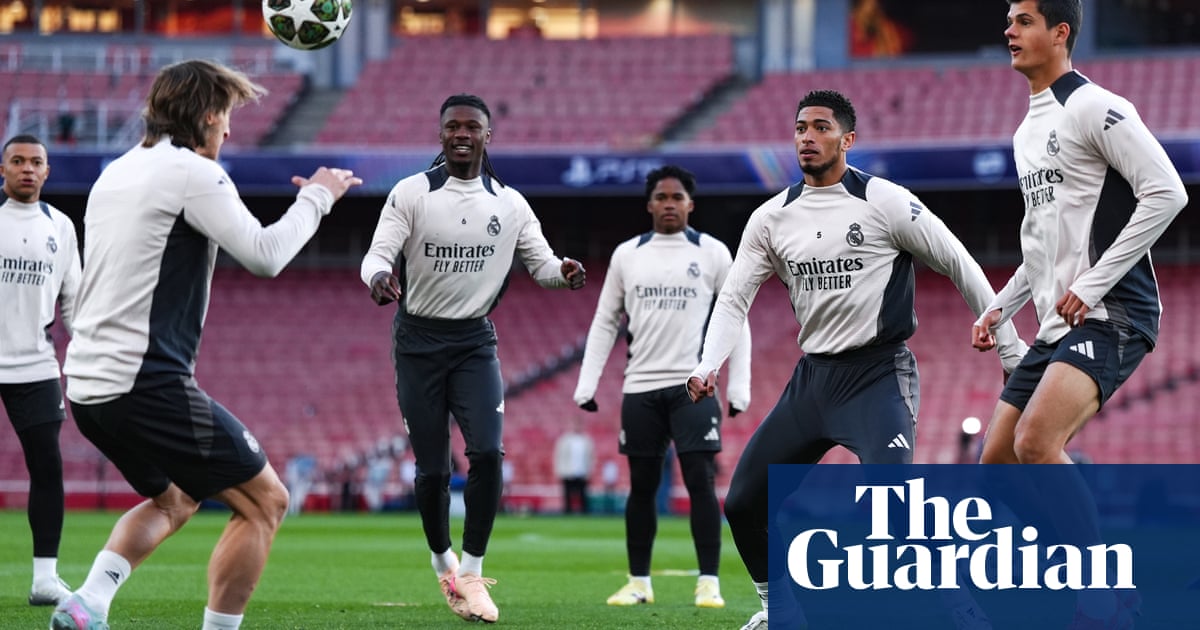At the end of Real Madrid’s 4-4 draw with Real Sociedad last week, Carlo Ancelotti was asked whether there had been any point at which he feared for their place in the Copa del Rey final. He had watched his team go 1-0, 3-1 and 4-3 down, the game heading into extra time before Antonio Rüdiger’s goal after midnight finally gave them a 4-4 draw, allowing them to scrape through 5-4 on aggregate. But still he said no.
“Because,” he reasoned, “anything can happen here.” And that, you couldn’t help wondering, may be precisely the problem. One day, anything would not happen, and then what?
The pity for Arsenal may be that Madrid found that out three days later, tangible warning arriving in time for their visit to London. It’s one thing to say it, another to actually experience it, to be faced with your own flaws, your own vulnerabilities when you felt invincible.
No one has made the ridiculous as routine as have Madrid, the implausible happening so often it feels inevitable. Destiny, fate, fortune … whatever you call it, whichever theory you favour or conspiracy you subscribe to in explaining the endless comebacks, there was a certain logic there, too: they have the players, the talent. Everyone knows that; so do they, which may not always help, willing them on to take risks, to play the odds, which one day become too great even for them.
On Saturday afternoon, Valencia went 1-0 up at the Santiago Bernabéu. Four minutes into the second half Vinícius Júnior equalised and, although it lacked the drama or noise of a European night, Madrid began to tighten the screw. The minutes went by, the final whistle coming closer, which only made the comeback feel more inevitable, until in the 95 minute the winner arrived. Only this time it came at the other end and may have cost Madrid the title, Hugo Duro’s header leaving them four points behind Barcelona with eight games to go.
This was Madrid’s fifth league defeat. Ancelotti was entitled to say that it was not the same as the others. Vinícius missed a penalty, although that is a problem in itself when they have missed five of 16 this season. Giorgi Mamardashvili, the Valencia goalkeeper, made six saves, one from Fede Valverde especially impressive. Kylian Mbappé did everything but score, including hitting a post. The xG was 3.16‑0.46. Valencia had three efforts on target and two went in. “Teams score against us with not very much,” Ancelotti complained. In seven days Madrid had conceded eight at the Bernabéu, against Leganés, Real Sociedad and Valencia.
The good news for Madrid is that of the four defenders and goalkeeper who started against Real Sociedad, conceding four, only one will likely be there against Arsenal; the same is true of the five that began against Valencia, although Ferland Mendy’s absence creates doubts at left-back and Aurélien Tchouameni, entrusted with protecting that defence when he doesn’t play in it, is suspended. The bad news is that this goes deeper – in their two games against Barcelona, they have conceded nine – and there was little sympathy.
If perhaps they hadn’t deserved defeat on Saturday, they had those other times. Keep tossing a coin, it won’t always come up heads. Madrid had played with fire that often, one day they were going to get burned; eventually they would run out of time. In the cup, they had needed extra time to defeat Celta Vigo and a last-minute goal from a youth-teamer, Gonzalo García, making his debut to knock out Leganés before the comeback against Real Sociedad.
In the Champions League, they had defeated Atlético Madrid on penalties in surreal circumstances. They finished the league phase 11th: outplayed and deservedly beaten by Liverpool and Milan, they had been 2-0 down at half-time against Dortmund, scored two second-half goals to edge Atalanta and beat Stuttgart despite being second best.
At the Bernabéu it had all started to wear a bit thin, too: the epic comebacks that excite everyone, that make matches all the more memorable, also revealed flaws, a lack of care. However fun it is, it shouldn’t always be this way. The fact that it felt almost willing, as if they needed to feel the jeopardy before they started playing, made it worse; even during the comeback against Real Sociedad, there were whistles, a growing irritation that it had to be this way, a kind of: “Oh, so now you run?”
after newsletter promotion
It is simplistic, of course, the classic complaint of supporters, but perhaps there is something in it. That night, Ancelotti had pulled Vinícius aside and threatened to take him off. Asked about it he didn’t deny it; instead he said, yes, and then the Brazilian started running. In extra time, Vinícius was extraordinary; for most of the 90 minutes he hadn’t been.
That Madrid’s problems, despite Ancelotti’s insistence to the contrary, can feel like an attitude thing invites the assumption that they are easily resolved: the Champions League is different. On Saturday, for many supporters, there was almost a weird satisfaction in the players finally getting what they deserved, lesson delivered in time.
How easily it can be applied is another matter. At what point can you no longer just flick that switch? Beneath that surface analysis, beyond the injuries and the fatigue which are undeniably there, beyond the lack of someone who can run the midfield, there’s also something systemic and even more simple: Madrid really haven’t been very good this season, and still less of late. Try to think of a genuinely impressive performance and only the Manchester City tie comes to mind. But then that’s Manchester City.
“Now the season starts for real,” Ancelotti said that night. It hasn’t really, and yet Madrid are still there, time still on their side, the treble still possible, as they set off to London. If they do lose there, well, there’s always the old Bernabéu comeback routine to repeat.
